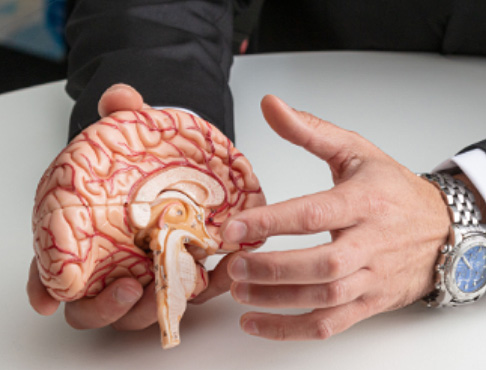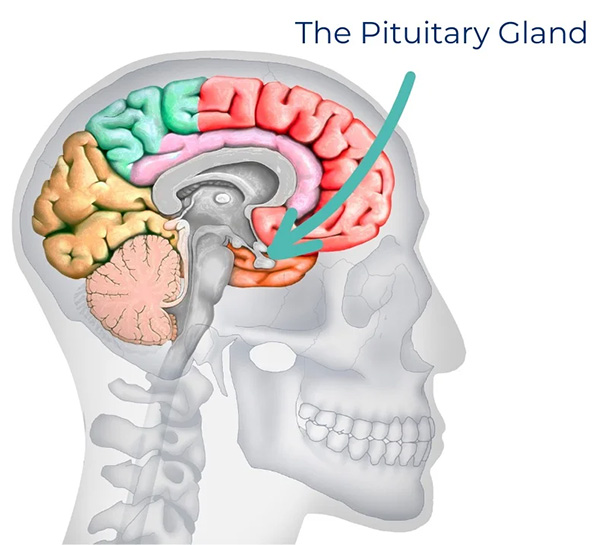Pituitary Tumours

Pituitary tumours are a relatively common type of brain tumour. Most are benign and can be treated successfully.
What do glands do?
Glands are small organs that make substances such as sweat, tears, digestive juices and hormones.
Endocrine glands – like the pituitary gland – release hormones directly into your bloodstream. Hormones are chemical messengers that regulate things like your metabolism, growth and response to stress.
Why is the pituitary gland called the “master gland”?
The pituitary gland has been nicknamed the “master gland” because it regulates the secretion of most of the body’s hormones.
Working closely with your hypothalamus, your pituitary gland constantly monitors glands and organs to decide whether to adjust its orders to your hormones.
The pituitary fulfils its role as “master gland” by producing the following hormones:
Growth Hormone (GH).
This hormone is responsible for growth. It also helps to regulate the metabolism.
Antidiuretic hormone (ADH).
ADH prompts the body to conserve water.
Adrenocorticotropic Hormone (ACTH).
ACTH activates the release of cortisol and aldosterone by the adrenal glands. Cortisol plays a crucial part in the metabolism, as well as the body’s stress response. Aldosterone helps to maintain water and sodium balance.
Prolactin.
Prolactin stimulates the production of breast milk.
Thyroid-stimulating hormone (TSH).
TSH prompts the thyroid gland to release thyroid hormones. Thyroid hormones regulate the metabolism and have an effect on almost every organ.
Luteinizing Hormone (LH) and Follicle Stimulating Hormone (FSH).
These hormones regulate the production of sex hormones in both men and women. They play an important part in coordinating a woman’s menstrual cycle.
Melanocyte Stimulating Hormone (MSH).
MSH controls the production of melanin, the dark pigment that is produced in the skin in response to sun exposure.
The pituitary gland also stores and releases oxytocin, a hormone that plays an important role in childbirth, breastfeeding and human bonding.
Where is the pituitary gland located?
The pituitary gland sits below your hypothalamus in line with the bridge of your nose, housed in its own small chamber called the sella turcica. Despite its significant role in your body, the pituitary gland itself is quite small – about the size of a pea.
What is a pituitary tumour?
A pituitary tumour is an unusual growth in your pituitary gland. A pituitary gland tumour may cause your pituitary gland to make too much or too little of certain hormones.
Most pituitary gland tumours are benign growths called adenomas. While these won’t spread to other parts of your body, they can interfere with normal function and cause troubling symptoms.


What are the symptoms of a pituitary gland tumour?
Pituitary gland tumour symptoms may occur if the tumour presses on surrounding structures in the brain (like your cranial nerves) or changes your hormonal production.
By pressing on other parts of your brain, a pituitary tumour could cause:
- Visual symptoms such as decreased peripheral vision, blurred or double vision or a drooping eyelid
- An altered sense of smell
- Headaches and nausea or vomiting.
Pituitary adenomas can also cause symptoms related to the hormonal functions of the pituitary gland. A pituitary adenoma may interfere with the gland function so that production of various hormones is impaired. If a pituitary tumour decreases your hormone production, you may experience:
- Fatigue
- Weakness
- Changes in your menstrual cycle
- Sexual difficulties or libido changes
- Nausea
- Weight changes
- Feeling cold.
In some cases, an adenoma may produce excess amounts of a particular hormone – this can also cause symptoms. A hormone-producing pituitary tumour is called a functional adenoma. Functional adenomas typically involve increased secretion of prolactin, ACTH or growth hormone.
When a pituitary adenoma leads to a hormonal excess, it could cause symptoms such as:
- Sexual dysfunction
- Menstrual irregularities
- Production of breast milk in a woman who is not pregnant or breastfeeding
- Depression
- Fatigue
- Infertility
- Growth problems
- Osteoporosis
- Unexplained weight gain or weight loss
- Muscle weakness
How is a pituitary tumour treated?
Pituitary adenomas may be treated with:
-
Watchful waiting
if the pituitary tumour is not causing symptoms -
Medication
to control symptoms or shrink a functional pituitary adenoma -
Radiation
we use Gamma Knife to deliver intense radiation with extreme precision -
Surgery
we usually take a minimally invasive approach, removing the pituitary tumour through your nose (trans-sphenoidal surgery). This reduces the risk of complications and may result in a faster recovery than open brain surgery.

Macquarie Neurosurgery and Spine’s staff are actively involved in furthering treatment for pituitary tumours.
Professor Antonio di Ieva has published extensively in pituitary surgery and pathology. One of his papers found that defining the aggressiveness of a pituitary tumour could help doctors predict how it would affect a patient and could therefore help them choose the most suitable treatment.
How can we help?
If you think you may be experiencing symptoms relating to your pituitary gland, then your GP may refer you to us. You can arrange a consultation at one of our NSW or ACT locations, by calling us on 02 9812 3900.
Alternatively, you can request an appointment via our enquiry form.
We look forward to meeting you and addressing your concerns.

All information is general and is not intended to be a substitute for professional medical advice. Macquarie Neurosurgery and Spine can consult with you to confirm if a particular procedure is right for you.
References
Cleveland Clinic, Pituitary gland, https://my.clevelandclinic.org/health/body/21459-pituitary-gland, {Accessed 27 May 2024]
Healthdirect, Pituitary gland and hormones, https://www.healthdirect.gov.au/pituitary-gland#, [Accessed 27 May 2024]
Mayo Clinic, Pituitary tumours, https://www.mayoclinic.org/diseases-conditions/pituitary-tumors/symptoms-causes/syc-20350548, [Accessed 27 May 2024]
National Institute of Diabetes and Digestive and Kidney Diseases, Cushing’s syndrome, https://www.niddk.nih.gov/health-information/endocrine-diseases/cushings-syndrome, [Accessed 27 May 2024]
Di Ieva A, Rotondo F, Syro LV, Cusimano MD, Kovacs K. Aggressive pituitary adenomas–diagnosis and emerging treatments. Nat Rev Endocrinol. 2014 Jul;10(7):423-35. doi: 10.1038/nrendo.2014.64. Epub 2014 May 13. PMID: 24821329. https://pubmed.ncbi.nlm.nih.gov/24821329/, [Accessed 29 May 2024]

